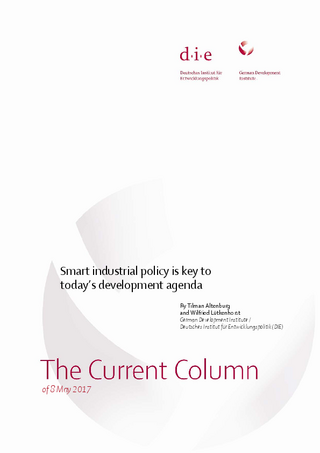Smart industrial policy is key to today’s development agenda
Altenburg, Tilman / Lütkenhorst, WilfriedThe Current Column (2017)
Bonn: German Development Institute / Deutsches Institut für Entwicklungspolitik (DIE) (The Current Column of 08.05.2017)
Bonn, 8 May 2017. Humankind is currently facing a series of enormous challenges, most of which have one thing in common: they go along with deep changes in the way our economies are structured and our societies organised. The future markets for goods, services and labour will differ radically from what we know today. Let us take a look at just three examples: Decarbonisation: By the end of the century (ideally even earlier), the currently fossil-fuel driven global economy needs to be fully carbon-neutral. This requires massive changes of our energy systems, our transport systems, the way we farm our land and produce our industrial goods; it implies nothing less than another ‘great transformation’, comparable in scale to the industrial revolution. Digitalisation: New technologies (digitalisation, robotics, additive manufacturing etc.) will enable machines to perform many of the tasks currently carried out by human workers, but at lower costs. It is estimated that about half of today’s jobs could potentially be ‘automated away’ within the next two decades – with far-reaching implications for both OECD and developing countries. Urbanisation: The growth of the urban population is among the most powerful trends worldwide. By 2035, seven billion people worldwide will live in cities. This will have deep implications for the structure of economies. First, city dwellers demand a greater variety of goods and services, which drives economic diversification. Second, agglomeration effects spur innovation. Third, cities need to shift away from current modes of transport and current building practices to low carbon alternatives requiring different technologies and materials. Again, existing professions, skills and competitive advantages of firms will be devalued and replaced by others. Dealing with such structural transformations is the domain of industrial policy – which we define as any attempt of a government to steer structural change towards agreed and desirable societal goals. In the past, industrial policy was mainly limited to creating more productive and diversified industries in order to allow for higher and more stable incomes. The new challenges force us to radically rethink this paradigm: we now need solutions for a zero-carbon economy; new ways of allocating societal tasks and creating sources of income to people in an inclusive way; finding smart ways of combining new services for liveable cities with employment creation, and so on. To be sure, addressing these challenges will have to rely on innovations brought about by competitive market forces. However, it will be more important than ever before to steer (often failing!) markets in a direction that can meet broader societal goals. While the long-term objectives of industrial policy thus are subject to profound changes, its design principles and success factors change much less. These include the need for a shared vision, a ‘national transformative project’, as a signpost for subsequent action and collaborative policymaking that involve private actors; governments should use competitive mechanisms in implementation; change should be gradual and sequenced in a way that national firms and workers can adapt; experimentation with technologies and markets should be encouraged and coupled with monitoring and evaluation to accelerate entrepreneurial and institutional learning. However, in developing countries, these good practices – which presuppose strong institutional capabilities – are often not in place. This is due to shortage of funding and experts, but also (and even more importantly) because of political practices of rent-seeking and clientelism. Hence, the countries that arguably need smart industrial policies the most typically lack the necessary preconditions for implementing them. How to overcome this dilemma is the central theme of a new book on Industrial Policy in Developing Countries, which is now available also in paperback. The book offers a comprehensive account of the controversial industrial policy discourse among economists. Moreover, it discusses the emerging big challenges of structural change in our century, and it provides practical insights into implementation challenges in low- and middle-income countries as well as five case studies covering Ethiopia, Mozambique, Namibia, Tunisia and Vietnam. The country studies reveal both industrial policy failures (from the lack of long-term perspectives for structural transformation to industrial parks that remain empty) to impressive successes (boosting the cut flower industry in Ethiopia or garment manufacturing in Vietnam) and extracts policy lessons. Just glossing over conflicts is never helpful. Where trade-offs exist (e.g. opening sectors up to global competition or phasing out highly polluting factories may wipe out local SMEs and lead to short-term employment losses), these need to be acknowledged and openly discussed. The book, which is aimed at researchers, policy-makers and development cooperation practitioners, replaces dogma by evidence and calls for a balanced viewpoint: yes, industrial policy is necessary to direct market actors and provide a long-term vision and no, it is never easy, requires risk-taking and thus may be subject to failure. However, the book also identifies safeguards that can help to minimize costly policy errors. In today’s world, special emphasis on green industrial policy is fundamental. Here again, the book looks at the special situation of developing countries and discusses the many co-benefits of a low-carbon growth path as well as possible early mover advantages.


